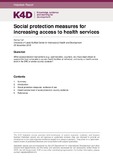| dc.contributor.author | Tull, Kerina | |
| dc.coverage.spatial | DRC | en |
| dc.date.accessioned | 2019-01-08T09:36:58Z | |
| dc.date.available | 2019-01-08T09:36:58Z | |
| dc.date.issued | 2018-11-05 | |
| dc.identifier.citation | Tull, K. (2018). Social protection measures for increasing access to health services. K4D Helpdesk Report 489. Brighton, UK: Institute of Development Studies | en |
| dc.identifier.uri | https://opendocs.ids.ac.uk/opendocs/handle/20.500.12413/14243 | |
| dc.description.abstract | Social protection is concerned with preventing, managing, and overcoming situations that adversely affect people’s well-being. According to the World Bank (2013) social protection in health (SPH) mechanisms are public interventions that assist households and communities to better manage financial risks caused by health expenditure, as well as provide support to the critical poor. Various social protection interventions have been used to support the most vulnerable to access health facilities at individual, community or health service levels. Successful examples in the Democratic Republic of Congo (DRC) include cash transfers, vouchers, and mutual health insurance. Many aid interventions can also be classified as forms of social protection, and the attention given to this sector is increasing (Weijs et al., 2012). The review finds that utilisation of health services in the DRC is low, particularly in rural areas - more than 30 million Congolese do not have access to quality healthcare (Richard et al., 2017). In addition to this, another key finding worth discussing is that there are two social security measures in the DRC: (i) Compulsory membership for employees in the state body in charge of social security (L'Institut National de Sécurité Sociale, or INSS), or (ii) Membership by choice in a mutual health insurance scheme. Furthermore, cash transfers were the more cost-effective modality in research on internally displaced households paying health expenses in eastern DRC (Evans and Popova, 2014; Aker, 2017); they also improved the outcome of children treated for severe acute malnourishment (Grellety et al., 2017). Accordingly, many international aid agencies are in favour of using vouchers in the DRC context for access to primary health care services (UNICEF, 2012; Aker, 2017; UNHCR, 2018), however ODI research shows aid agencies still have further to go in embedding cash transfers within their systems and cultures (Bailey, 2017). | en |
| dc.language.iso | en | en |
| dc.publisher | IDS | en |
| dc.relation.ispartofseries | K4D Helpdesk Report;489 | |
| dc.rights.uri | https://www.nationalarchives.gov.uk/doc/open-government-licence/version/3/ | en |
| dc.subject | Health | en |
| dc.subject | Rights | en |
| dc.subject | Social Protection | en |
| dc.title | Social Protection Measures for Increasing Access to Health Services | en |
| dc.type | Other | en |
| dc.rights.holder | © DFID - Crown copyright 2018. | en |
| dcterms.dateAccepted | 2018-11-05 | |
| rioxxterms.funder | Department for International Development, UK Government | en |
| rioxxterms.identifier.project | K4D | en |
| rioxxterms.version | VoR | en |
| rioxxterms.funder.project | 238a9fa4-fe4a-4380-996b-995f33607ba0 | en |

